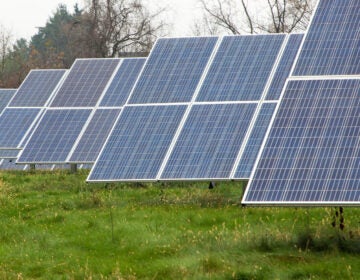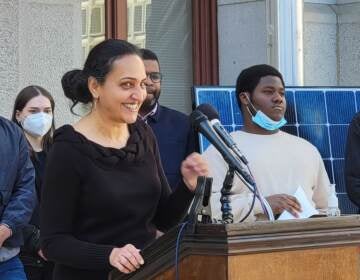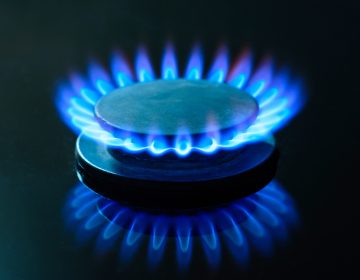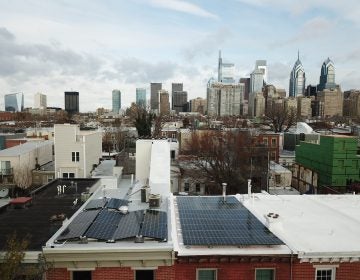The Philly region is claiming millions in home energy tax credits. Here’s how taxpayers saved
President Biden’s 2022 climate law expanded the tax credits, which cover the costs of heat pumps, air conditioners, home insulation and solar panels.
Listen 1:14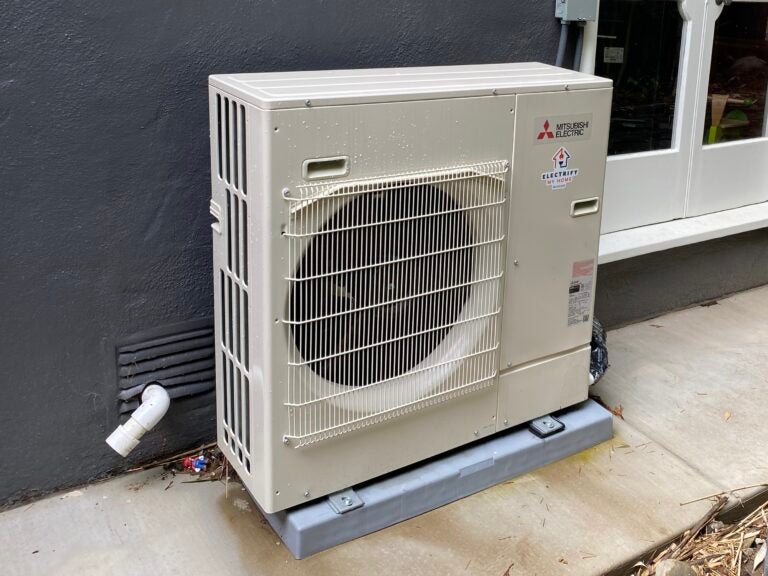
Heat pumps can work for both heating and cooling. You can think of a heat pump as an air conditioner that can also work backward. (Julia Simon/NPR)
This story is part of the WHYY News Climate Desk, bringing you news and solutions for our changing region.
From the Poconos to the Jersey Shore to the mouth of the Delaware Bay, what do you want to know about climate change? What would you like us to cover? Get in touch.
Taxpayers in Delaware, New Jersey and Pennsylvania claimed close to $500 million in credits for clean energy and energy-efficient home improvements last year, according to federal data.
Advocates hope to see the credits increasingly used to make homes more climate-friendly.
“The policy is working,” said Ari Matusiak, CEO of Rewiring America, a national nonprofit that promotes electrification and related government rebates and tax credits. “But the policy depends on people knowing about it and taking advantage of it.”
The tax credits — which cover home improvements such as insulation, exterior windows and doors, electric heat pumps and solar energy — were expanded and extended under the Inflation Reduction Act, the massive climate bill President Biden signed in 2022. For example, the credit for electric heat pumps rose from $500 before the law to $2,000 in 2023.
Taxpayers in the Delaware Valley took advantage of the incentives at a higher rate than the national average, data released by the U.S. Treasury Department shows.
More than 3% of households that filed Individual Income Tax Returns in Delaware for tax year 2023 claimed the clean energy or energy efficiency credits — a usage rate that puts Delaware behind only New England states and Florida.
Just under 3% of taxpayers in New Jersey and Pennsylvania claimed the credits.
The energy-efficient home improvement tax credits were much more popular than the credits that incentivize clean energy purchases. Nearly four times as many taxpayers in Pennsylvania, Delaware and New Jersey used the home improvement credits that cover investments such as insulation and appliances, compared to those that cover purchases such as solar panels, batteries and geothermal systems.
Barriers for low-income households
Some of the activities and goods covered by the tax credits, such as energy audits, insulation and efficient appliances, can help lower households’ utility bills. But nationally, higher-income households disproportionately used the tax breaks for costs in 2023 (the Treasury Department did not release income data for tax credit users by state).
Alon Abramson claimed one of the tax credits after installing an electric heat pump system in his West Philly home last year. Abramson, who oversees residential programs at the Philadelphia Energy Authority, said the $2,000 credit only covered a fraction of the roughly $10,000 cost.
This — and the fact that a tax credit, as opposed to a point-of-sale rebate, requires a household to make an investment up-front — means the tax credits can be challenging for low-income households to use.
“I needed to have either the $10,000 on hand or access to credit to be able to spread those payments out,” Abramson said. “That could be a whole year or more, depending on when you file your taxes, before you see that money returned to you. That in itself is really a condition that only folks with a good amount of capital can take advantage of.”
Joline Price, an attorney at Community Legal Services who helps low-income households navigate utility shutoffs and high bills, does not see the tax breaks as the solution for her clients — even though home improvements like insulation or new windows could often help lower their bills. Many of her clients don’t make enough to be required to file taxes, she said.
“They’re barely making it work — if they’re even making it work — to get through the month,” she said. “What our clients need are direct investments in repairs and energy efficiency — people coming to do the work on their home without having to put up any up-front capital.”
Abramson hopes that point-of-sale rebates for high-efficiency electric home appliances through the Inflation Reduction Act will be more useful for households struggling with energy bills. Pennsylvania expects to roll these rebates out early next year.
Climate-friendly home improvements the tax credits cover
Nationally, most households that claimed the tax credits this spring used them to recoup costs of solar panels, insulation or air sealing, windows and exterior doors, federal data shows.
Many households also claimed credits covering appliances that burn planet-warming fossil fuels, such as efficient natural gas, propane or oil water heaters and furnaces.
More households used the credits to recoup costs of traditional central air conditioners than electric heat pumps, which are considered a climate solution because they’re efficient, can replace both air conditioners and gas-powered heaters and run on electricity, which can be produced using renewable energy.
“It’s disappointing,” Abramson said. “That indicates to me that we’re still in an early stage of helping that transition and making sure people are aware of the fact that heat pumps are technology that exists and that we’re using the tax [credit] tool to promote that shift towards electrification broadly.”
The home energy tax credits currently extend through the early 2030s and can be used each year, with no lifetime limit. They cover 30% of costs of the following with a yearly limit for some items:
- Home energy audits
- Insulation and air sealing
- Exterior doors and windows
- Water heaters
- Central air conditioners
- Furnaces and boilers
- Heat pumps
- Heat pump water heaters
- Solar water heaters
- Solar power generation
- Wind power generation
- Geothermal power generation
- Battery storage
WHYY is your source for fact-based, in-depth journalism and information. As a nonprofit organization, we rely on financial support from readers like you. Please give today.



